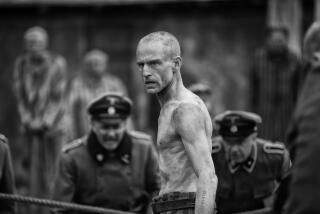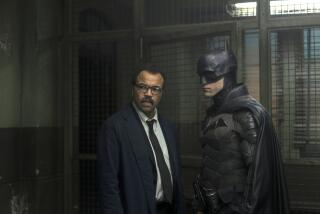Drama in Mideast Recalls Another Tense War Scare : Television: Today’s brinkmanship is similar to 1962’s Cuban Missile Crisis. Both events showcase the power of the medium to convey high-stakes political drama.
- Share via
TV or not TV. . . .
THE WINDS OF WAR: October, 1962.
President John F. Kennedy goes on TV to tell of the Cuban Missile Crisis, and the nation holds its breath, in fear of war.
The tension was similar to this month’s war scare over the United Nations deadline for Iraq to get out of Kuwait.
In both cases, TV registered shock waves as world leaders, including Kennedy and now President Bush, used the medium as a weapon.
Kennedy imposed a blockade to halt Soviet military weapons headed for Cuba. The missiles posed the threat of a nuclear strike against the United States.
Some Americans went so far as to load up on food and supplies in case war came.
But Soviet Premier Nikita S. Khrushchev backed down and ordered the destruction of Cuban missile sites--and when Kennedy announced victory on TV, it was his greatest moment.
A personal memory: Jackie Gleason, bursting with pride and relief over the Soviet backdown, reflected the national mood as he poured out his feelings on his CBS show.
NO SALE: CNN’s announcement that it would ban commercials for at least the first 24 hours of any conflict with Iraq also brings back memories of Kennedy--his assassination in 1963.
There was no CNN then, but CBS, NBC and ABC all suspended commercials for several days as they covered the most overwhelming event in American television history.
So drained was the nation that some viewers reacted with almost numb disbelief when Kennedy’s supposed assassin, Lee Harvey Oswald, was shot and killed by Jack Ruby--live on TV--during those few days of craziness.
MODERN TIMES: The hard-pressed Big Three networks know their reputations are at stake more than ever now because of cable competition such as CNN and C-SPAN, and so they vowed to preempt regular shows for as long as necessary to cover a war with Iraq.
Ongoing crisis plans at the networks made it possible for ABC Entertainment President Bob Iger to say that all-out war might preempt prime-time shows for days, maybe a week.
Whatever happens, all of TV is dealing with its new responsibility in the instant, satellite-transmission age.
Who can forget how officials of the new China suddenly found themselves having to be polite as they were televised around the world while trying to shut down CNN and CBS news operations in Beijing during the 1989 student revolution?
A SPECIAL DAY: What an irony that today’s anniversary of the birth of the Rev. Martin Luther King Jr., a man who epitomized peace, should come simultaneously with the war-threatening Iraq deadline.
Marking the birthday of the slain civil rights leader, KCET Channel 28 has scheduled a two-hour special at 10 tonight, “King: A Filmed Record--From Montgomery to Memphis.”
BLOOD, SWEAT AND TEARS: Maybe there wasn’t a Gettysburg address. Maybe it wasn’t the Lincoln-Douglas debates. On the other hand, historians may find much of similar value in future years in those extraordinary, televised debates in the Senate and House over U.S. military involvement against Iraq.
Who, for instance, could possibly forget the sight and sound of Democratic Sen. Robert Byrd of West Virginia as the white-haired political leader--effectively if hammily--cited examples of the ancient past in his thoughts on whether to authorize President Bush to go to war in the Persian Gulf?
The republic is indebted to C-SPAN for the way its two channels preserved the totality of the debates for history--one recording the Senate, the other the House. C-SPAN long ago became indispensable. Now it is a force of historic importance itself as television’s ultimate source of government in our time.
PBS’ all-out coverage of the debates was also significant. With cable outlets such as C-SPAN luring its upscale audience away, PBS did what it should have been doing for years--aggressively covering immediate news events of national significance. One hopes there’ll be a lot more of that on PBS instead of lazily elite, fuddy-duddy programming.
RETURN ENGAGEMENT: If ABC is indeed presenting prime-time entertainment instead of war next Monday, Tyne Daly, who went from “Cagney & Lacey” to a stage revival of “Gypsy,” will turn up in a TV movie.
It’s called “The Last to Go,” and the four-time Emmy winner (for “Cagney & Lacey”) plays a woman whose marriage and family change over 22 years.
She also hopes to take “Gypsy” to London come spring: “ ‘Cagney & Lacey’ was always a big deal in England. I’d love to show them my stage wares.”
On Jan. 28, meanwhile, Daly is reunited on TV with her “Cagney & Lacey” co-star, Sharon Gless. The occasion is a guest shot on Gless’ new CBS series, “The Trials of Rosie O’Neill,” in which they play classmates at a high school reunion.
“You know, of course,” says Daly, “that eventually these two gals are going to have to wind up in the bathroom (one of the trademark ‘Cagney & Lacey’ scenes). So of course we do.”
HIGH TIME: Cable’s ACE awards couldn’t have done better than naming John Hart as top newscaster. If you’ve never caught his “World Monitor” series on the Discovery channel, it’s first-rate, and it’s on twice daily--at 4:30 p.m. and 10 p.m.
TOGETHER AGAIN: Jann Carl signed on for three more years as Hal Fishman’s co-anchor at KTLA Channel 5.
WAR FRONT: As Americans argue their involvement in a Middle East conflict, KCET offers a timely rerun of the 13-part series “Vietnam: A Television History,” starting Jan. 24.
More to Read
The complete guide to home viewing
Get Screen Gab for everything about the TV shows and streaming movies everyone’s talking about.
You may occasionally receive promotional content from the Los Angeles Times.






